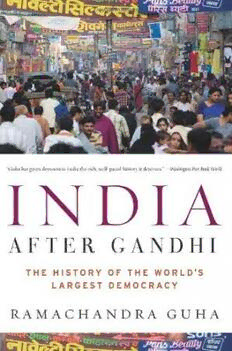
India After Gandhi: The History of the World's Largest Democracy PDF
Preview India After Gandhi: The History of the World's Largest Democracy
R G AMACHANDRA UHA INDIA AFTER GANDHI The History of the World’s Largest Democracy PAN BOOKS For Ira, Sasha and Suja: lights on my coast India is a pluralist society that creates magic with democracy, rule of law and individual freedom, community relations and [cultural] diversity. What a place to be an intellectual! . . . I wouldn’t mind being born ten times to rediscover India. R B , departing US ambassador, in 2003 OBERT LACKWILL Nobody could be more conscious than I am of the pitfalls which lie in the path of the man who wants to discover the truth about contemporary India. N C , IRAD HAUDHURI The Autobiography of an Unknown Indian (1950) Contents Prologue: Unnatural Nation P O – P P ART NE ICKING UP THE IECES 1. Freedom and Parricide 2. The Logic of Division 3. Apples in the Basket 4. A Valley Bloody and Beautiful 5. Refugees and the Republic 6. Ideas of India P T – N ’ I ART WO EHRU S NDIA 7. The Biggest Gamble in History 8. Home and the World 9. Redrawing the Map 10. The Conquest of Nature 11. The Law and the Prophets 12. Securing Kashmir 13. Tribal Trouble P T – S C ART HREE HAKING THE ENTRE 14. The Southern Challenge 15. The Experience of Defeat 16. Peace in Our Time 17. Minding the Minorities P F – R P ART OUR THE ISE OF OPULISM 18. War and Succession 19. Leftward Turns 20. The Elixir of Victory 21. The Rivals 22. Autumn of the Matriarch 23. Life Without the Congress 24. Democracy in Disarray 25. This Son also Rises P F – A H E ART IVE ISTORY OF VENTS 26. Rights 27. Riots 28. Rulers 29. Riches 30. A People’s Entertainments Epilogue: Why India Survives Acknowledgements Notes Index Prologue Unnatural Nation I Because they are so many, and so various, the people of India are also divided. It appears to have always been so. In the spring of 1827 the poet Mirza Asadullah Khan Ghalib set out on a journey from Delhi to Calcutta. Six months later he reached the holy Hindu city of Banaras. Here he wrote a poem called ‘Chirag-i-Dair’ (Temple Lamps), which contains these timeless lines: Said I one night to a pristine seer (Who knew the secrets of whirling Time), ‘Sir, you well perceive, That goodness and faith, Fidelity and love Have all departed from this sorry land. Father and son are at each other’s throat; Brother fights brother. Unity and Federation are undermined. Despite these ominous signs Why has not Doomsday come? Why does not the Last Trumpet sound? Who holds the reins of the Final Catastrophe?’1 Ghalib’s poem was composed against the backdrop of the decline of the Mughal Empire. His home territory, the Indo-Gangetic plain, once ruled by a single monarch, was now split between contending chiefdoms and armies. Brother was fighting brother; unity and federation were being undermined. But even as he wrote, a new (and foreign) power was asserting its influence across the land in the form of the British, who were steadily acquiring control of the greater part of the subcontinent. Then in 1857 large sections of the native population rose up in what the colonialists called the Sepoy Mutiny and Indian nationalists later referred to as the First War of Indian Independence. Some of the bloodiest fighting was in Ghalib’s home town, Delhi – still nominally the capital of the Mughals and in time to become the capital of the British Raj as well. His own sympathies were divided. He was the recipient of a stipend from the new rulers, yet a product of Mughal culture and refinement. He saw, more clearly than the British colonialist did then or the Indian nationalist does now, that it was impossible here to separate right from wrong, that horrible atrocities were being committed by both sides. Marooned in his home, he wrote a melancholy account of how ‘Hindustan has become the arena of the mighty whirlwind and the blazing fire’. ‘To what new order can the Indian look with joy?’ he asked.2 An answer to this question was forthcoming. After the events of 1857 the Crown took over control of the Indian colonies. A sophisticated bureaucracy replaced the somewhat ad-hoc and haphazard administration of the old East India Company. New districts and provinces were created.
